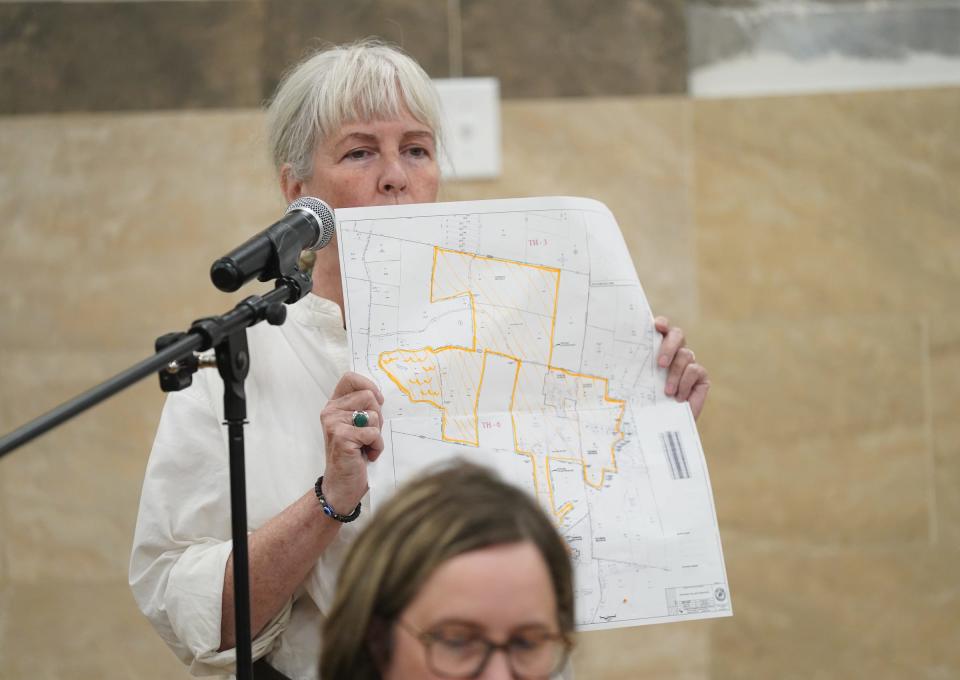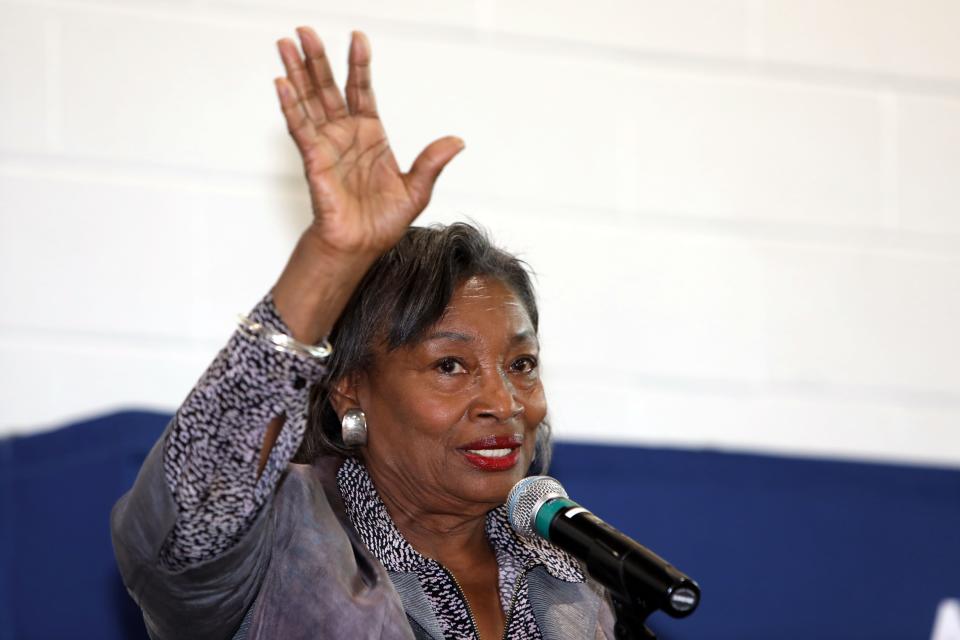NY may change how villages are formed. Would that derail Hasidic village plans?
- Oops!Something went wrong.Please try again later.
Two bills that tighten New York's rules to form a village may pose fresh hurdles for plans by Hasidic communities in Orange and Sullivan counties if Gov. Kathy Hochul signs either this month.
Both bills would update an old law that requires little more than a petition, a population of at least 500 people and a referendum to start a village. Critics say that simple recipe makes it too easy for a group of citizens to add a layer of local government that is largely obsolete and sought mostly as a way to seize power from a town government.
The bills were approved by state lawmakers in June and are among the last pieces of legislation left for Hochul to approve or reject in the final weeks of the year.
Each would raise the bar for a new village and demand studies of how it would affect taxes, services and other factors. One change alone in both bills would disqualify the village petitions in Orange and Sullivan if applied to them: raising the minimum population to 2,000 from 500.
Both village plans are tied up in court. In Sullivan, opponents of the proposed Ateres in the towns of Thompson and Fallsburg are challenging 22 petition signatures to try to get it voided. Their suit stopped the town supervisors from scheduling a referendum after they declared the petition valid in September.

In Orange, the five-year-long quest to create the village of Seven Springs in the town of Monroe is going through another round of litigation after Supervisor Tony Cardone rejected it as flawed in September.
Neither proposed village has 2,000 or more inhabitants: Ateres had 834 and Seven Springs had 597 when the petitions were filed. The question is whether both plans would fail for that reason if their backers win in court but Hochul has signed one or both reform bills.
What would the bills do?
New York now has 532 villages, most dating back to the 1800s and early 1900s. They were created within towns to provide services such as water, sewer and road maintenance for populated areas — functions that town governments later took on. Each has its own laws and elected leaders.
Only six formed in the last 30 years. The trend is just the opposite: 28 villages dissolved through voter referendums in that same time, including one on Long Island that folded in 2016 after only six years in existence.
"We're updating a very antiquated law," said state Sen. James Skoufis, the Orange County Democrat who sponsored the bill in the Senate.
He said his bill would correct an overly simplistic set of legal steps. He called it "patently insane," for instance, to expect a population of only 500 — including children — to shoulder the full range of modern municipal duties and roster of elected leaders.
The other bill, sponsored in the Senate by Majority Leader Andrea Stewart-Cousins of Yonkers, would go even further, creating a state panel with three appointees to review all village petitions, taking them out of the hands of town supervisors. That panel would do two studies — feasibility and impact — before deciding whether to allow a referendum on a proposed village.

Supporters and opponents
Among the groups urging Hochul to sign both bills is Catskill Mountainkeeper, a nonprofit environmental advocacy group for the region in which the Ateres village would be formed.
In a memo last month to Hochul in support of the Skoufis bill, the group argued that the existing rules made sense in the early 1900s, when villages were needed to bring services to rural spots that were quickly growing.
Ateres plan: Viznitz Hasidim in Sullivan County seek to forge their own village with 929 acres
"But times have changed and today this law is being exploited to create small, independent villages that do not respect existing local land use and building regulations, thereby undermining sustainable development and critical environmental protections," wrote Katherine Nadeau, deputy directorof Catskill Mountainkeeper.
Disaffected groups should resolve disputes over zoning or other issues in other ways, such as winning town elections, Jennifer Grossman, a Sullivan County attorney advising Mountainkeeper on the bill campaign, suggested in an interview. Creating a new municipality is too drastic a remedy, she said.
"It's sort of like building a bonfire to light a candle," she said.
The bills' opponents include the New York State Conference of Mayors and Municipal Officials, which urged Hochul to veto both in two memos last month.
That group disputes the need for a higher population threshold, saying 291 villages and 347 towns in New York get by today with fewer than 2,000 residents. It argues that village boundaries more closely define and represent the communities they serve than their surrounding towns.
"Villages have always been the most democratic form of government in New York," wrote Peter Baynes, the conference's recently retired executive director. "They are the only local government that can be created and dissolved by voter initiative."
What do the petitioners say?
Both bills specify that the higher population threshold applies to existing village petitions. But does that mean the two Sullivan County town supervisors must rescind their approval of the Ateres village petition if Hochul signs the bill?
Zev Tarkletaub, who helped steer the village effort, thinks not. He says a judge ultimately would have to determine if the law affects a petition that has been deemed legal but not yet put to a referendum.
"It's not a 'pending' petition," Tarkletaub said of the Ateres proposal. "It's a petition that was already signed off by two towns."
He explained the village effort earlier this year as a way for the small Viznitz Hasidic community in the Kiamesha Lake area to create a local government focused on their unique needs, like streetlights and sidewalks for pedestrian safety. He said the community had no interest in changing the zoning.
Late bill: NY bill could derail plans to create Hasidic village in Orange County. Here's how
Seven Springs, the Orange County proposal, has never gotten the same approval. But it shouldn't have to meet new legal standards after being held up for years by decisions and arguments that the courts have rejected, argued Steven Barshov, attorney for the petitioners.
Barshov also questioned the merits of the reform bills, suggesting, for example, that applying a single population threshold across the state was too rigid to account for differences in density.
"Hopefully, this will not be something the governor entertains," he said.
What about the Westchester village plans?
A citizens group in Westchester County has been trying to incorporate the Edgemont area of the town of Greenburgh since 2016. After waging court fights over two attempts with Greenburgh Supervisor Paul Feiner, who opposes the plan, it has collected signatures for a third village petition, which it has not submitted yet. A Rochester-based consulting firm is doing a state-funded study of what its impact would be.
Edgemont has around 8,000 residents, so the higher population threshold wouldn't be a problem. Other bill pieces could present new hurdles, although Bob Bernstein, an attorney and former Edgemont resident who advised the organizers, said those issues could be resolved with changes that are being negotiated by Hochul's office and the bill sponsors.
Those changes would take the form of "chapter amendments" that lawmakers must pass after Hochul has signed the bill. Bernstein said those amendments would exempt Edgemont in recognition of the study now being done by the nonprofit Center for Governmental Research.
They also would bar Feiner from using any findings from that study as reasons to reject the next petition, he said.
Chris McKenna covers government and politics for The Journal News and USA Today Network. Reach him at cmckenna@gannett.com.
This article originally appeared on Rockland/Westchester Journal News: NY Hasidic village plans could be derailed by bill on Hochul's desk

